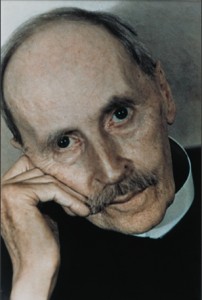 What do you think of “Jean Christophe”? To reply that I had not read it resulted in a reaction of surprise from Chinese friends … I was all the less forgivable because I live in Paris around the Luxembourg Garden, near the 162 Boulevard du Montparnasse, where Romain Rolland stayed and wrote “Jean Christophe”.
What do you think of “Jean Christophe”? To reply that I had not read it resulted in a reaction of surprise from Chinese friends … I was all the less forgivable because I live in Paris around the Luxembourg Garden, near the 162 Boulevard du Montparnasse, where Romain Rolland stayed and wrote “Jean Christophe”.
Romain Rolland, a writer without borders:
He was a writer, an intellectual of a stature and influence which we can scarcely imagine if we refer to what has become of the intellectuals in present-day France.
The volume and the variety of his works are considerable: novels, biographies, history of art, music, essays, plays. The abundance and the quality of the correspondence are impressive; he was in contact with intellectuals from all over the world. Teacher a few years, publisher of magazines and political activist whose positions have had a great influence.
Born in the Nièvre in 1866 (1), he studied in Paris and entered the Ecole Normale. Music occupies an important place in his life; he plays piano, becomes a specialist of music history and, with Paul Claudel, often visits concert halls.
He works for the Franco-German friendship and for a humanism based on European civilization. He opposed war but the pacifism of a publication, celebrated in 1914, “Above the fray”, had only a limited impact in France.
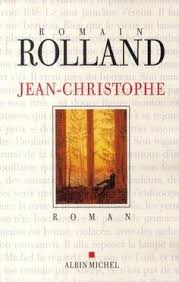 After the war, he became interested in non-violence in India and wrote about R. Tagore and Gandhi. As from the 1930’s, he hoped for a new world and supported the Soviet Union but was let down by the Moscow trials in 1936. Settled in Switzerland, in Villeneuve, from 1922 to 1938, his life ended in Vézelay where he died at the end of 1944.
After the war, he became interested in non-violence in India and wrote about R. Tagore and Gandhi. As from the 1930’s, he hoped for a new world and supported the Soviet Union but was let down by the Moscow trials in 1936. Settled in Switzerland, in Villeneuve, from 1922 to 1938, his life ended in Vézelay where he died at the end of 1944.
“Jean Christophe”, a forgotten novel that one can read:
A saga in ten volumes, published from 1904 to 1912, for which he obtained the Femina Award in 1905 and the Nobel Prize in 1916. The novel of the life of a musician, Jean Christophe Krafft, born German, refugee in Paris then in Switzerland, again in Paris after a few months in Italy … a sort of Beethoven of the 20th century.
It is in 1904 that Romain Rolland releases “The Life of Beethoven” in the Cahiers de la Quinzaine of Peguy which will also publish “Jean Christophe”. JC Krafft is a hero who tries to maintain his faith in mankind and in it’s universal value, a man who seeks harmony between reason and heart, a character whose emotions command the development of the plot and of his actions.
One can read with interest and pleasure the 1500 pages of the new edition in 2007 (2). One is sometimes disturbed by the abundance of details, a naturalism that was not, however, his literary following. We also regret pages filled with too many moral or philosophical comments … But these overlong passages are forgotten when one reads superb portraits, remarkable psychological analysis of the characters, their conflicts or their loves.
The author gives us an astonishing portrait of the life in Paris, a Paris he does not like: “He went down into the street. The October mist was thick and pungent; he had that bland odor of Paris, where the exhalations of the factories of the suburbs and the heavy breath of the city are mingled. We could not see ten paces away. The gleam of the gas lamppots trembled like a candle that was going to be extinguished. In the half-darkness a cohort of people rolled in contrary waves … “(p.612). A Paris of which he also criticizes the superficial intellectual life and the impact of fashion …
“Jean Christophe”, a novel famous … in China:
Romain Rolland is with Victor Hugo, the most famous French writer in China. Victor Hugo is well known for his works but also for his positions against the sack of the Summer Palace by the French army and his defense of the dignity of the country.
Chinese intellectuals felt close to Romain Rolland’s European humanism, to his pacifism. Fu Lei (1908-1966) played an essential role. He studied literature and art history in Paris from 1928 to 1931. Music is his passion and his son Fu Ts’ong, born in 1934, is a world-renowned pianist who married in England the daughter of Yehudi Menuhin. Fu Lei, denounced as rightist, committed suicide with his wife during the Cultural Revolution in 1966.
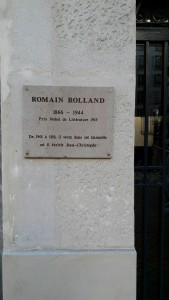 Fu Lei first translated the biography of Beethoven by Romain Rolland. Beethoven is probably the most admired Western musician in China. He is considered a revolutionary who supports universal brotherhood and who does not bow before the powerful. “Jean Christophe” benefited from this devotion for Beethoven whose biography is on the list of readings of high school students in China.
Fu Lei first translated the biography of Beethoven by Romain Rolland. Beethoven is probably the most admired Western musician in China. He is considered a revolutionary who supports universal brotherhood and who does not bow before the powerful. “Jean Christophe” benefited from this devotion for Beethoven whose biography is on the list of readings of high school students in China.
Fu Lei, from 1937 to 1941, published a translation of “Jean Christophe” with a substantial apparatus of explanatory notes. A first partial translation was produced by Jing Yinyu (1901-1931) for which Romain Rolland wrote a preface in 1925: “Jean Christophe to his brothers in China”: “I know neither Europe nor Asia. I know only two races in the world, that of the rising souls, that of the falling souls. I am with the first, whatever they may be, they are my friends, my allies, my brothers. My homeland is free humanity “.
Jing Yinyu had translated into French Lu Xun’s “The true story of Ah Q”. Romain Rolland organized in 1926 the publication of this important text in the magazine Europe. The writer was won over and went so far as to recommend Lu Xun to the Nobel Academy. Lu Xun thanked him by publishing in literary magazines articles and parts of the works by Romain Rolland
Romain Rolland, Ah Q and Chinese civilization:
In 1929, Romain Rolland met, at his request, in Villeneuve, Yan Zonglin, a 22-year-old student from the University of Fribourg. He is the son of a family of poor peasants in Shanxi who succeeded in studying in Beijing and then in 1925 to participate in Lyon in the work and studies program. In 1929, he obtained a scholarship for Fribourg and a degree in ancient history. From 1929 to 1931, Rolland paid him a monthly fee and Yan explained to him Ah Q thoroughly and introduced him to Chinese culture.
In a letter to Jean Guehenno (17/2/1930), Rolland writes: “I have seen many young Chinese in recent months. They are very interesting. Not at all as Indian or Japanese. Art and metaphysics have little interest for them. But a very great for the agonizing questions of the time: moral-social-life or death. “
As for Fu Lei, besides the translations of Voltaire and Balzac, he published two other biographies by Romain Rolland: Tolstoy and Michelangelo. As from 2009, at the initiative of the French Embassy in China, the Fu Lei Prize was awarded, in three categories, for the translation of French works into Chinese. The jury chairwoman for the 2016 award was Sylvie Gentil, the well-known translator
Bertrand Mialaret
(1) Several elements of this article come from the website of the Association Romain Rolland www.association-romainrolland.org
(2) Romain Rolland, “Jean Christophe, a novel” Editions Albin Michel, 2007, 1500 pages, 29 euros.
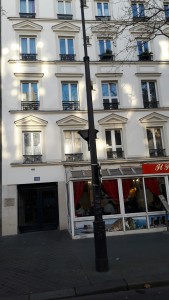
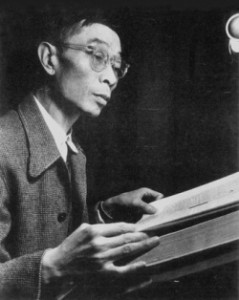






Thanks for informative sharing,